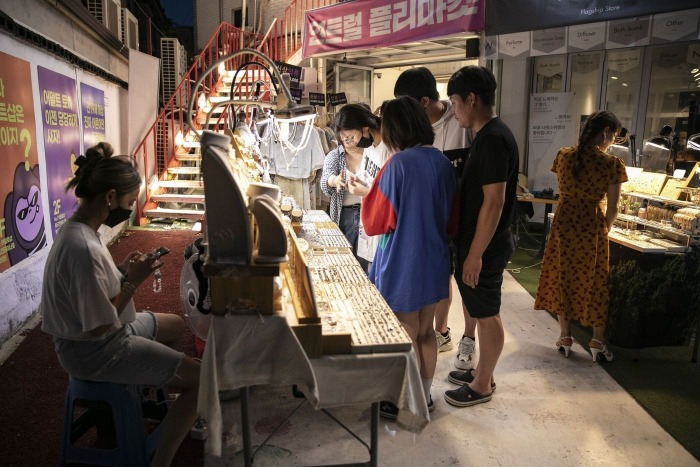South Korea’s Inflation reaccelerates in July
The benchmark consumer-price index rose 2.6% from a year earlier, following a 2.4% gain in June
By The Wall Street Journal Aug 02, 2024 (Gmt+09:00)
Samsung steps up AR race with advanced microdisplay for smart glasses


When in S. Korea, it’s a ritual: Foreigners make stops at CU, GS25, 7-Eleven


Maybe Happy Ending: A robot love story that rewrote Broadway playbook


NPS yet to schedule external manager selection; PE firms’ fundraising woes deepen


US auto parts tariffs take effect; Korea avoids heavy hit



South Korea’s headline inflation picked up at a stronger-than-expected pace in July, reaccelerating due to higher prices for agricultural and oil products, after easing for three consecutive months.
The benchmark consumer-price index rose 2.6% from a year earlier, following a 2.4% gain in June, the country’s statistics office said Friday.
That was stronger than the median forecast of 2.5% projected by 19 economists polled by The Wall Street Journal.
Compared with the prior month, the index rose 0.3% in July compared with the median forecast of a 0.2% increase. In June, it fell 0.2% from the previous month.
Core CPI, which strips out volatile food and energy prices, gained 2.2% from a year ago in July and rose 0.3% from a month earlier.
Unfavorable weather conditions for harvesting agricultural products sent prices for vegetables and fruits higher in July, restoking inflationary pressure. Prices for petroleum products also increased as the effect of temporary fuel-tax cuts tapered off.
The pickup in headline inflation may stoke caution among monetary-policy makers even if they still expect inflation in South Korea to keep trending lower.
The Bank of Korea expects inflation to average 2.6% in 2024 and 2.1% next year in South Korea. Inflation averaged 3.6% in 2023 in the country.
Market expectations have recently grown for the central bank to pivot toward policy easing, given that the country’s economy risks losing steam after a prolonged period of tight monetary policy.
The bank in July held the base rate steady at a 15-year high of 3.50% for a 12th straight time. Most analysts forecast a rate cut in October or November.
Write to Kwanwoo Jun at Kwanwoo.Jun@wsj.com
-
 EconomyS.Korea’s inflation holds below 3% for 3rd straight month
EconomyS.Korea’s inflation holds below 3% for 3rd straight monthJul 02, 2024 (Gmt+09:00)
2 Min read -
 EconomyS.Korea’s inflation slows to 10-month low amid tight policy
EconomyS.Korea’s inflation slows to 10-month low amid tight policyJun 04, 2024 (Gmt+09:00)
2 Min read -
 Central bankBOK sees more uncertainty in rate cut timing, ups growth forecast
Central bankBOK sees more uncertainty in rate cut timing, ups growth forecastMay 23, 2024 (Gmt+09:00)
3 Min read -
 EconomyKorea’s headline inflation dips below 3% in April but erratic
EconomyKorea’s headline inflation dips below 3% in April but erraticMay 02, 2024 (Gmt+09:00)
3 Min read


